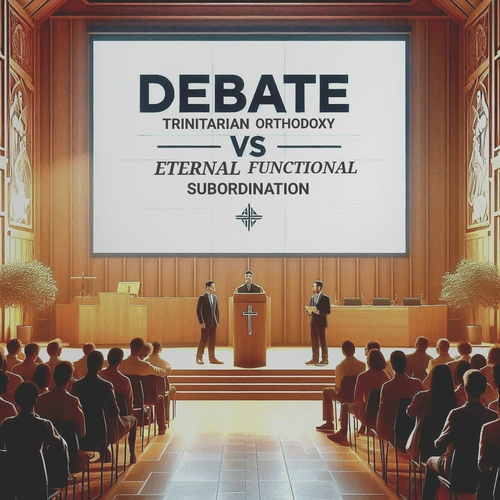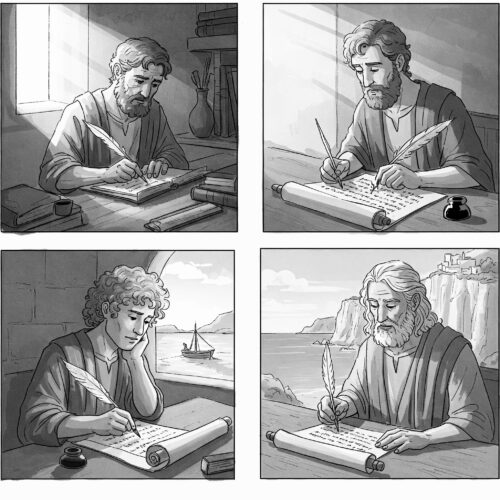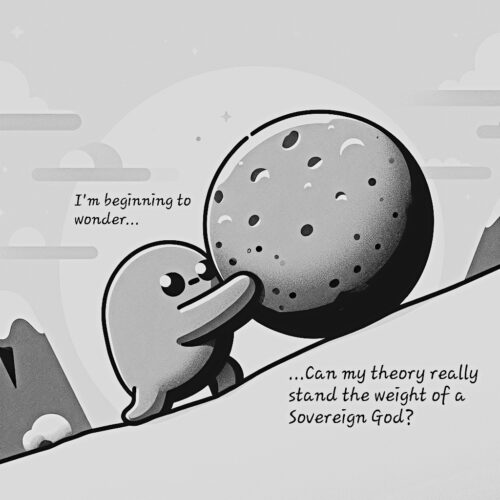Is Jesus Eternally Subordinate to the Father? A Reformed Critique
Few theological questions strike as deeply at the heart of Christian doctrine as the relationship between the Father and Son within the Trinity. In recent decades, a view known as Eternal Functional Subordination (EFS) has gained traction in some evangelical circles, suggesting Jesus is eternally subordinate in authority to the Father. This post examines this claim through the lens of historic Reformed theology and argues such subordination applies only to Christ’s incarnate state, not to His eternal divine nature.
The distinction matters profoundly. If Christ is eternally subordinate, this creates a hierarchy within the Godhead that fundamentally alters how we understand the Trinity. From the Reformed perspective, the biblical witness and historical Christian consensus point toward the full equality of the divine persons in both being and authority.
IS JESUS ETERNALLY SUBORDINATE? THE BIBLICAL FOUNDATION
Proponents of eternal subordination often point to passages like 1 Corinthians 11:3 (“the head of Christ is God”) and Jesus’ statement that “the Father is greater than I” (John 14:28). Yet these texts must be interpreted in light of the overall biblical testimony.
Philippians 2:6 explicitly states Christ “did not consider equality with God something to be grasped.” The Greek word for “equality” here denotes exact equivalence—Christ possessed equality with God by nature. Similarly, Jesus’ bold declaration “I and the Father are one” (John 10:30) caused His opponents to accuse Him of blasphemy precisely because they understood He was claiming divine equality.
When Scripture speaks of Christ’s submission, it consistently does so in reference to His incarnate state. Jesus voluntarily took “the form of a servant” (Phil 2:7) for the purpose of redemption. His submission represents not an eternal reality but a temporary posture assumed for our salvation.
IS JESUS ETERNALLY SUBORDINATE? THE HISTORICAL REFORMED POSITION
The Reformed tradition has consistently upheld the full equality of the divine persons. The Westminster Confession states that within the Trinity, there exists “the same substance, power, and eternity” (2.3). John Calvin, while acknowledging the Father as the “beginning of deity” in terms of order, emphatically denied any inequality:
“It is not fitting to suppress the distinction that we observe to be expressed in Scripture between the Father and the Word… But meanwhile the deity of the Son is not diminished by this, nor does his eternal essence.”
Reformed theologian BB Warfield similarly maintained the distinctions between the persons “do not carry with them any suggestion of inequality either in nature or in dignity.” Charles Hodge and Herman Bavinck, too, vigorously defended the essential equality of the divine persons against any notion of eternal subordination.
THEOLOGICAL PROBLEMS WITH ETERNAL SUBORDINATION
Eternal subordination poses several irreconcilable problems for orthodox theology:
- Divine Simplicity: If the Son is eternally subordinate in authority, this introduces complexity into the divine essence, contradicting the doctrine that God is not composed of parts.
- Unity of the Godhead: An eternal hierarchy within the Trinity threatens the perfect unity of the divine will and operation.
- Person/Essence Distinction: Traditional Trinitarian doctrine distinguishes between the divine persons while maintaining the equality of their shared essence. Eternal subordination blurs this distinction.
- Perichoresis: The mutual indwelling of the divine persons (perichoresis) affirms their complete equality. A hierarchy of authority contradicts this mutual interpenetration.
- Inseparable Operations: Reformed theology has long held the external works of the Trinity are undivided—all three persons participate fully in every divine action, contradicting any notion of subordinate authority.
ORIGINS AND DEVELOPMENT OF EFS
The concept of EFS is relatively recent in theological history. Its contemporary formulation emerged primarily in the late 20th century, first gaining prominence through George Knight III’s book The New Testament Teaching on the Role Relationship of Men and Women (1977). Knight sought to ground complementarian gender roles in the eternal relationship between Father and Son.
This approach was subsequently developed and popularised by theologians Wayne Grudem and Bruce Ware. Their arguments linked male headship in the home and church to what they described as the eternal authority structure within the Trinity. The Son’s submission to the Father, they contended, provides the pattern for gender-based authority structures.
In 2016, this view sparked a major theological controversy known as the “Trinity Debate,” with prominent Reformed theologians like Carl Trueman, Liam Goligher, and Michael Bird arguing EFS represents a departure from historical orthodoxy. Even many complementarians, while supporting traditional gender roles, rejected the attempt to ground these in alleged eternal subordination within the Trinity.
What makes EFS particularly problematic from a Reformed perspective is its departure from the historical consensus on Trinitarian doctrine established in the Nicene and Constantinople tradition and affirmed by the Protestant Reformers. The consensus has consistently maintained the full equality of divine persons while recognising their distinct personal properties.
ECONOMIC SUBORDINATION EXPLAINED
Reformed theology distinguishes between the “immanent Trinity” (God as He exists in Himself eternally) and the “economic Trinity” (how God relates to creation through time). Christ’s submission to the Father belongs exclusively to the economic Trinity—specifically to the incarnation.
In the incarnation, the eternal Son voluntarily assumed a human nature and with it a servant’s position for the purpose of redemption. As Philippians 2:6-8 teaches, Christ “emptied himself,” taking “the form of a servant” and becoming “obedient to the point of death.” This submission was not an eternal reality but a temporary status assumed for our salvation.
At the completion of Christ’s redemptive work, Scripture indicates He resumes His full and equal authority. As 1 Corinthians 15:28 describes the end when “the Son himself will also be subjected to him who put all things in subjection under him,” this refers not to eternal subordination but to the completion of Christ’s mediatorial work in the economy of salvation.
IMPLICATIONS FOR CHRISTIAN DOCTRINE
The denial of eternal subordination has profound implications for Christian faith and practice:
- Worship: If Christ is merely a subordinate deity, He cannot be worshipped as fully God. The Reformed insistence on Christ’s equal authority preserves His worthiness of absolute worship.
- Salvation: Only a fully divine, non-subordinate Saviour can offer perfect atonement. Any diminishment of Christ’s authority potentially undermines the sufficiency of His saving work.
- Christology: The Chalcedonian definition affirms Christ is “consubstantial with the Father according to the Godhead.” Eternal subordination threatens this essential equality.
For believers, this theological discussion impacts how we pray, whom we worship, and how we understand God’s very nature. It’s not merely academic but touches the heart of Christian devotion.
CONCLUSION: IS JESUS ETERNALLY SUBORDINATE?
From the Reformed perspective, Jesus’ subordination to the Father applies exclusively to His incarnate state, not to His eternal divine nature. The Son is eternally equal to the Father in both essence and authority, temporarily assuming a submissive role for our redemption.
This view aligns with Scripture, the historic creeds, and the Reformed confessions. It preserves the fundamental equality within the Trinity while acknowledging the economic roles undertaken for salvation. Against the relatively recent innovation of Eternal Functional Subordination, Reformed theology maintains that the divine persons share one essence, one power, and one authority—equal in glory and coeternal in majesty.
FOR FURTHER READING
- Herman Bavinck, Reformed Dogmatics, Volume 2: God and Creation
- Keith E. Johnson, Rethinking the Trinity and Religious Pluralism
- Robert Letham, The Holy Trinity: In Scripture, History, Theology, and Worship
- Fred Sanders, The Triune God
- Kevin Giles, The Eternal Generation of the Son
IS JESUS ETERNALLY SUBORDINATE? RELATED FAQs
Don’t texts like John 14:28 explicitly state the Father’s superiority? These passages refer to Christ’s temporary incarnate state, not His eternal divine nature. As Calvin noted, “Christ does not speak of his eternal essence, but of that middle state which was lower than divine glory.” These statements must be understood in the context of Jesus’ voluntary humiliation in the incarnation, not as revelations about eternal intra-Trinitarian relations.
- Doesn’t rejection of EFS undermine complementarian gender roles? Many Reformed complementarians reject EFS while maintaining traditional gender roles based on direct biblical teaching rather than Trinitarian analogies. The two positions aren’t inherently linked. Attempting to ground gender roles in the Trinity creates more theological problems than it solves, and verges on subordinationism.
- If there’s no functional subordination, how are the divine persons distinguishable? The divine persons are distinguished by their eternal relations of origin (the Father unbegotten, the Son begotten, the Spirit proceeding), not by hierarchical authority. Orthodox Trinitarian theology has never required authority relationships to maintain the distinctions between divine persons.
What about 1 Corinthians 15:28, which says the Son will be subject to the Father? This verse describes the culmination of Christ’s mediatorial kingdom, not an eternal state of subordination. The context clearly refers to Christ’s role in the economy of redemption as He delivers the kingdom to the Father after conquering all enemies. This represents the completion of His messianic mission, not an eternal authority structure.
- If the Son is equal in authority, why does He say He can do nothing of Himself (John 5:19)? These statements reflect the perfect unity of will and action among the divine persons, not a hierarchy of command. Jesus emphasises He acts in perfect harmony with the Father, illustrating the inseparable operations of the Trinity rather than subordination.
- Doesn’t the Son’s eternal generation from the Father imply subordination? Eternal generation concerns the Son’s personal property and relation of origin, not a hierarchy of authority or being. Just as light proceeds from the sun without being inferior to it, the Son’s generation from the Father implies distinction without subordination or inferiority.
How can the Father send the Son if they possess equal authority? The ‘sending’ of the Son represents a voluntary economic arrangement, not an eternal authority structure. This mission was freely embraced by the Son in the covenant of redemption and reflects the personal distinctions within the Trinity, not an eternal chain of command.
IS JESUS ETERNALLY SUBORDINATE? OUR RELATED POSTS
Editor’s Pick
The Woodpecker’s Design: How Nature’s Headbanger Defies Evolution
Imagine a bird that slams its head against solid wood 20 times per second, enduring impacts of 1,200 G-forces—the force [...]
The Ear’s Intricate Design: Too Complex for Random Chance
The Ear's Intricate Design: When we listen to our favourite song, hear a loved one's voice, or notice the warning [...]
The Euthyphro Dilemma: Did God Invent Morality or Discover It?
A Biblical Creationist Answer to the 2400-Year-Old Question The Euthyphro Dilemma has challenged folks for over 2,400 years. First posed [...]
Outdo One Another in Showing Honour: What Does It Really Mean?
“Love one another with brotherly affection. Outdo one another in showing honour.” Paul’s instructions in Romans 12:10 present us with [...]
The Anthropic Principle: How’s Our Universe Designed for Life?
Ever wondered why our universe seems so perfectly suited for life? The Anthropic Principle addresses this very question: it notes [...]
Who Wrote the Gospels? Evaluating Modern Scholarship
The four Gospel writers—Matthew, Mark, Luke, and John—are the foundational witnesses to Christ's life and teaching. Yet, the question of [...]
The Fossil Record: Does It Really Show We Evolved from Apes?
The Fossil Record: Does It Really Show We Evolved from Apes? The fossil record has long been presented as [...]
Wrestling with Identity: When God Asks Jacob His Name
In the darkness by the Jabbok River, Jacob wrestles with a mysterious figure until daybreak. Exhausted and injured, yet refusing [...]
The Fatal Flaws of Middle Knowledge: A Reformed Critique
Middle Knowledge is one of the most sophisticated attempts to reconcile divine sovereignty with human freedom. Proposed by the 16th [...]
If Jesus is God, Why Does He Call Himself ‘Son of Man’?
A fascinating aspect of Jesus' ministry is how He repeatedly refers to Himself as the "Son of Man." The title [...]















